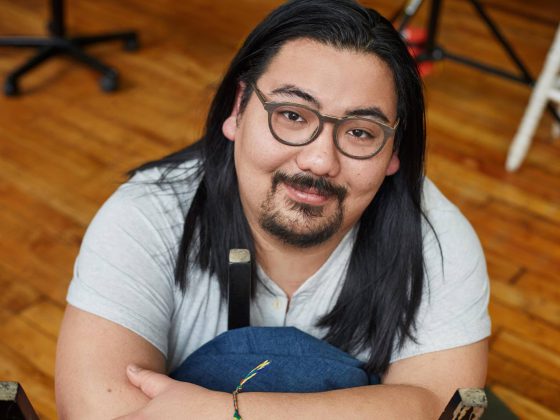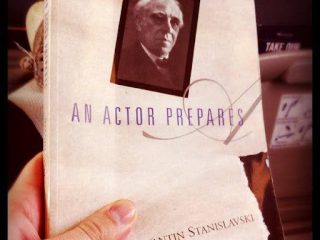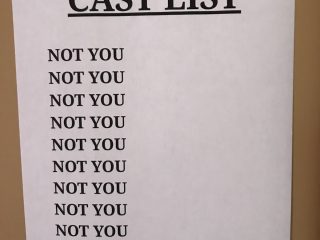There’s an old joke: between a social life, good grades, or enough sleep, college students get to choose two. When you’re a theatre major, you’re lucky if you get one. Being a theatre student can be a grueling, exhausting experience. The days start early and end late. You’re physically exhausted from dance class and then you have a rehearsal. You get used to cramming in studying and lunch at the same time. It’s a tough lifestyle, but it doesn’t have to be completely intolerable. I’m going to share some self-care tips that helped me when I was in the midst of college life.
Make It A Habit
We all talk about self-care, but let’s face it: it’s a lot easier said than done. I think that’s especially true when you’re in college. The key for me was making it routine. Whether it’s setting aside 20 minutes every Saturday or five minutes every morning, creating even small habits can have a big impact. Find what works for you – exercise, reading, meditation – and then force yourself to make it part of your routine. I was fortunate enough to live close to campus, so I walked to class every day. That built-in ten minutes of my day allowed me to listen to music or a podcast, and tune out the world for a while.
Don’t Isolate
One of the biggest regrets I have from college is the extent to which I allowed myself to isolate. As a natural introvert, it was easy for me to decline getting together with friends on the weekend or going to cast parties. I prioritized using that time to re-charge, which is important, but there’s also a lot of value in commiserating and camaraderie. Even having a small cadre of one or two people to serve as your support network or self-care accountability buddies is helpful.

Have Non-Theatre Friends
Don’t get me wrong, I love theatre people. But there were occasions when, for various reasons, the last group of people I wanted to be around were theatre people. It can be really easy to get insulated in our theatre bubbles, and that’s not a bad thing. It’s comfortable in there. But it’s also valuable to get outside of that bubble from time to time. In college, it often felt like there was nothing else except theatre and that everything was defined by the roles I got (or didn’t get). Having people who weren’t involved in theater helped me divorce myself from the pressures and stresses that can come with college theatre by reminding me that being an aspiring artist is just one part of myself. On a similar note, having diverse hobbies helps too. If you can find the time, join a club on campus or take up an activity that is unrelated to theatre.
Recognize Harmful Environments
It’s an unfortunate reality that theatre is riddled with abuse. College theatre is no exception. There’s an inherent power imbalance in theatre, be it between actors and directors or teachers and students. In academic theatre, both worlds collide. As young artists, the mantra “anything for the craft” is often drilled into us. But that doesn’t mean that we should allow for toxic environments. This goes for inside and outside the classroom. Acting classes should be places to stretch our boundaries and be vulnerable, but not dangerously so. If you feel like the lines between acting class and therapy are becoming blurred, it’s worth looking at whether the class is being run safely.
Stop Relying On External Validation
The more you rely on external sources to validate you or your work, the more miserable you’ll be. Start getting into the habit of honestly assessing yourself instead of letting praise or the number of roles you get be the barometer of your worth. It’s a hard thing to do, but creating a healthy mindset when it comes to assessing yourself as a student and artist will serve you well beyond college.
It’s Okay to Say No
If you’re anything like me, a malignant people-pleaser, the word ‘no’ is one of the hardest things to say. When I was in college, I said ‘yes’ almost by default before I’d even fully thought through whether I had the bandwidth to commit to whatever it was I was being asked to commit to. In theatre, there tends to be this notion that if you’re really committed, you’ll say yes to everything. After all, if you don’t do it there’s always someone right behind who will, and maybe they deserve the opportunities instead. Resist that notion as much as you can. Being of service and doing lots of things is great, but not at the expense of your wellness. Get comfortable with politely and professionally saying ‘no’, and saying it without feeling the need to explain yourself. My go-to is some variation of “thanks for the invite, but I’m not able to commit to that right now. I hope you’ll keep me in mind in the future”.
Check In With Yourself
I heard from a nutritionist once that it’s a good idea to check in with yourself every three hours or so throughout the day. You’ll want to identify your general energy levels and when you last ate and drank. Once a week, it’s also a good idea to do a big-picture check in: how was your general mood and energy level that week? Did you make time for yourself? What’s causing you stress or anxiety? Naming it and claiming it is often the first step towards minimizing it.

Practical Stuff
Here are some of the top activities that I and many people I know use as self-care mechanisms. Some may work for you, others may not. It’s important to find what’s doable for you.
Yoga
This one kills two birds with one stone- the flexibility and enhanced breath support yoga provides will also benefit you as a performer. There are countless yoga tutorials on YouTube if you’re not sure where to start. Yoga with Adriene is one of my favorites.
Meditation
There are lots of meditation apps available. Headspace is a popular one. You can also find lots of guided meditations on YouTube.
Music and podcasts
I curate a playlist just for self-care with music that always gives me a serotonin boost. Podcasts are also a great way to escape the world for a while. If you’re looking for industry-related podcasts, there are plenty. I recently started listening to Dead Eyes, about actor Connor Ratliff’s experience getting fired by Tom Hanks from a small role on Band of Brothers. In a light-hearted but honest way, it deals with the failure and rejection that come with being an actor.
Creative outlets
Don’t feel like you need to limit yourself to theatre as a creative outlet. Writing, painting, sculpting…they can all be great ways to decompress.
The good news is, more and more colleges and universities are taking steps to help address mental health and wellbeing. State University of New York at Buffalo has a helpful self-care assessment that you can use as a guide for yourself.
If you feel like you need additional support, odds are good that your school has some sort of resource center. Many campuses have counseling centers available. If your school has a graduate psychology or counseling program, they may offer counseling services provided by grad students. The life of a theatre student isn’t always easy, but there are resources and tools to help. What are some of your favorite self-care routines?














